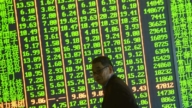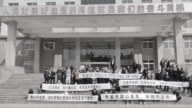【新唐人2013年10月31日讯】“还在银行存钱吗?存款不再绝对安全了!”日前,大陆多家媒体纷纷报导,央行将在今年年底或明年年初将推行银行存款保险制度,允许银行破产。如果银行陷入破产,将不可能全部兑现储户存款,存款人的利益将会受到直接损害,也就是说,百姓的钱存在银行也不再绝对安全。
据报导,中国人民银行原副行长,中国金融会计学会会长马德伦透露,中国银行存款保险制度的设计已经基本完成,即将出台。
所谓银行存款保险制度,是指银行按照一定比例标准,向特定机构缴纳一定保险金,当自身发生兑付风险、破产等危机时,由存款保险机构通过资金援助等方式,来保障银行的清偿能力。在这一制度下,一旦银行发生破产倒闭等事件,储户存放在银行的资金不至于颗粒无收。
长期以来,大陆一直是由政府和中央银行对存款提供隐形担保,存款银行要按规定向央行缴纳16.5%到20%的存款准备金,当存款银行出现风险,政府会出面兜底,因此本金一般不会受到影响。
例如1998年,海南发展银行因不能按时清偿债务而关闭,最后由央行指定工商银行托管它的债权债务,保证支付大陆居民在这家银行的储蓄存款本金及合法利息。
既然已经有存款储备金,为什么还要搞存款保险制度?
专家认为,种种迹象表明,中共当局已经意识到了大陆金融体系即将崩溃的危机,并且不愿为此承担任何风险。
中国金融分析师任中道:“它就是想把所有的危机往外转嫁出去,本身它有存款储备金,各银行收100块钱,得交20块钱给央行,这就相当于一种存款保险了。它现在还要做这个,就相当于它完全不想负担这个危机。”
据了解,今年中国有16家上市银行的不良贷款余额上升,16家银行不良贷款余额达4,400亿元,相比去年年末增加了近400亿元。
9月3号,国际著名评级机构“标准普尔(Standard & Poor’s)”,就《中国50大银行报告》进行解读,“标普”认为,中国的中小金融机构,将在即将面临的三大风险中,先行破产。三大风险包括出口、产能过剩、和地方债。
很多金融评论也指出,当前大陆银行系统风险越来越高,一方面与地方政府债务高度捆绑,形成巨大的贷款黑洞和无数呆账、坏账。另一方面由于央行基础货币的超发,导致银行无节制的发放贷款。
任中道:“它为什么风险大,就是它不断的放贷出去,结果现在收不回来,就产生了这样的坏账,它没有钱。为什么现在好像钱荒又来了,就是它已经放出去,收不回来。另外被中共内部他们这些权贵太子党给瓜分掉了这些钱,所以它钱肯定十分紧张,很脆弱了,现在。”
今年初,国际资本机构就中共地方债务风险以及银行表外贷款的风险,不断发出警告﹔《经济学人》杂志刊登一篇〈 寻找下一个雷曼兄弟 〉的文章,暗喻大陆正成为下一个雷曼兄弟。原因是,大陆自2008年以来,债务爆炸增长。据估计,大陆债务占GDP比重已经超过200%。
中国金融分析师任中道认为,一旦中国银行系统崩溃必将引发金融海啸,并将直接影响到中共政权。但目前危机已经形成,中共也无力回天,只好将风险转嫁到百姓身上。
任中道:“中共当局对于现在金融危机的处理已经不能它内部消化,也就是说,国家的信用、政府的财政已经化解不了这个危机,因此必须把这个危机给转嫁出去,所以中共央行用‘存款保险’的名义,瞒天过海继续来忽悠老百姓。”
大陆未来存款保险机构可能实行限额保险制,对每个银行账户的保险上限,初步设定为50万元人民币,也就是最多赔付50万。
中国百姓感叹:存在银行的钱越多,越不安全啊!
采访编辑/张天宇 后制/李勇
China’s Issuing Deposit Insurance May Put the Public at Risk
“Are you still keeping a bank deposit?
It might not be safe any more!"
Reports of China’s central bank launching a bank-deposit
insurance system has many Chinese saying these words lately.
With this system, depositors won’t totally lose all their deposits
should the bank fail.
This shows having bank savings in China is no longer secure.
Ma Delun, former vice-chair of the People’s Bank of China,
revealed recently in a financial forum that
a bank deposit insurance system proposed by the central bank
is ready to be launched.
With a bank deposit insurance system,
the bank pays with a certain proportion of the standard
to receive financial assistance when the bank is facing risks
or bankruptcy.
Under the system, depositors will be able to retrieve
some of their savings should the bank fail.
Over the years, China’s government and central bank
have provided invisible guarantees to deposits.
The Chinese banks have been paying the central bank
in the range of 16.5% to 20% for deposit reserve.
The government generally assist the depositors and
the failing banks.
Take the Hainan Development Bank as an example,
the bank closed in 1998 over debt problems.
The central bank relayed its debt to the Industrial and
Commercial Bank of China to pay back the savings
and interest to Hainan Development Bank depositors.
Why is a bank deposit insurance system needed
on top of this deposit reserve?
Experts say these are signs showing
the Chinese Communist regime is not willing to cover the loss,
realizing mainland China’s financial system is collapsing.
Financial analyst Ren Zhongdao: “It is shifting the risk.
The bank has to pay 20 dollars to the central bank for
every 100 dollar deposit as a reserve.
It is equivalent to a kind of deposit insurance.
With the new bank deposit insurance,
the government is saying it’s no longer covering the risk. “
There are 16 listed banks with increasing
non-performing loans this year.
The total non-performing loans have amounted
to 440 billion yuan ($72 billion), which is nearly a 40 billion
yuan ($6.5 billion) increase compared to late last year.
According to a study by Standard & Poor’s on Sept. 3,
out of China’s top 50 Banks, small and medium banks
are highly exposed to the three major crises in the areas of
export, oversupply and local government debt.
In the event of crisis, these banks will go bankrupt first.
Many financial commentators have also pointed out
that the banks in China are highly vulnerable.
The tight relations with off-budget local debts
have created countless bad debts on one hand,
and the unrestricted bank loans due to
excessive money printing on the other.
Ren Zhongdao: “Unrestricted loans have created a huge risk
because of too much bad debt.
The money shortage was thus created.
The Communist bigwigs such as the princelings
have also participated to share the pie.
The whole financial system is extremely fragile."
Earlier this year, international finance institutions
have warned China of the risks of high local debts and
interbank borrowings.
The Economist published the article, Where’s the next Lehman,
inferring that China is the next big bankruptcy case.
The reason is that credit growth in China
is estimated to be over 200% of its GDP.
Financial analyst Ren Zhongdao says that a financial tsunami
is inevitable once the Chinese banking systems collapse.
It will pose direct impact on the Chinese Communist regime.
The regime has realized the current crisis is unsolvable
and thus is shifting the risk to the people.
Ren Zhongdao: “The Communist authorities can no longer
handle the domestic financial crisis.
Its credibility and financial organs can no longer resolve it.
The central bank is issuing this bank-deposit insurance
to deceive the public while shifting the crisis onto the people."
The coming bank deposit insurance may have a limit
of 500,000 yuan ($82,000), meaning people
can get compensation of 500,000 yuan at most.
Chinese people lament, saying:
The more you save in the bank, the riskier it is!
Interview Edit / Zhang Tianyu Post-production /

























